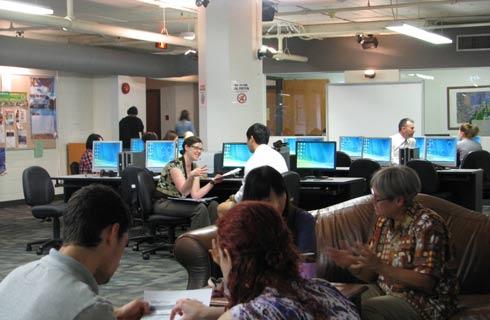- IDP China>
- 课程库>
- 工程与技术>
- 工程学及其相关技术>
- 电气电子工程技术>
- Bachelor of Engineering - Electrical and Electronic Engineering (Honours)
工学学士-电子工程(荣誉学位)
Bachelor of Engineering - Electrical and Electronic Engineering (Honours)

学历文凭
Bachelor Degree with Honours

专业院系
School of Engineering

开学时间

课程时长

课程学费

国际学生入学条件
IDP—雅思考试联合主办方

雅思考试总分
6.5
- 雅思总分:6.5
- 托福网考总分:90
- 托福笔试总分:160
- 其他语言考试:Pearson PTE Academic 56 and no PTE communicative skills below 46
CRICOS代码: WI0144
申请截止日期: 请与IDP联系 以获取详细信息。
课程简介
Study a Bachelor of Engineering with Honours degree at the University of Waikato and build a solid foundation for your professional engineering career. Gain practical experience by applying what you learn to real-world situations. The Bachelor of Engineering with Honours (BE(Hons)) degree focuses on how complex engineering problems that matter to society can be solved using engineering design principles and methods. At every stage of your degree, you'll be involved in conceptualising, designing and creating sophisticated engineering products, structures or processes. Electrical and Electronic Engineering at Waikato is a uniquely future-focused integration of computer science involving software programming, data management, artificial intelligence and cyber-security with core electrical and electronic principles in modern power systems, electronic design, embedded systems and communication. As a graduate specialising in Electrical and Electronic Engineering you will be ready to contribute to the electricity industry evolution from legacy generation and distribution models into an immediate future of distributed generation and storage, smart grids and new generation paradigms around renewable resources. These trends impact not just the traditional electricity industry itself, but also generate new opportunities and requirements within agriculture, manufacturing, construction, transport electrification and automation and smart building management.
相关申请
 预科
预科 奖学金
奖学金 实习机会
实习机会 在校学习
在校学习 跨境学习
跨境学习 校园授课-线上开始
校园授课-线上开始 在线/远程学习
在线/远程学习
开学时间&学费
学费信息仅供参考,请与IDP联系以获取详细信息
| 开学时间 | 时长 | 学费 | 地点 |
|---|
学校排名

世界排名401
数据源:
泰晤士高等教育世界大学排名
关于怀卡托大学

怀卡托大学成立于1964年,被公认为新西兰研究实力顶尖的大学,在2025年QS世界大学排名中位列新西兰前三,全球排名第235位。怀卡托管理学院位列全球商学院前1%。学院以追求卓越和创新而闻名,提供由顶尖学者和知名国际教授授课的优秀学术课程。怀卡托大学每年提供超过2000个实习机会或行业主导的项目,并与政府、行业和社区组织建立了牢固的合作伙伴关系,从而为学生提供更广泛的职业选择和实践学习机会。该大学在汉密尔顿和陶朗加拥有两个充满活力的校区,均位于新西兰出口导向型经济的中心地带。这两个校区营造了充满活力、包容的氛围,营造了一个互相支持的社区,让学生在学业和社交方面都能蓬勃发展,让他们在学习期间感到宾至如归。校园内拥有70多个俱乐部和120多个社团,学生可以参加各种各样的活动。这些俱乐部涵盖各种类别,从学术俱乐部、兴趣俱乐部到体育和文化组织,满足学生的广泛兴趣。国际学生还将获得全面的学业和职业支持,帮助他们适应新国家的生活。
本校相关课程
其他相关课程

微电子与计算机工程理学硕士
 赫特福德大学
赫特福德大学泰晤士高等教育世界大学排名:765
学历文凭
Masters Degree (Taught)
开学日期
课程费用总额


Immersive Technology MSc
 伦敦大学皇家霍洛威学院
伦敦大学皇家霍洛威学院泰晤士高等教育世界大学排名:451
学历文凭
Masters Degree (Taught)
开学日期
课程费用总额


机电工程学士(荣誉学位)/电气与电子工程学士(荣誉学位)(093504F)
 纽卡斯尔大学
纽卡斯尔大学学历文凭
Dual Degree
开学日期
课程费用总额


MEng (Hons) Mechatronics Engineering
胡弗汉顿大学
泰晤士高等教育世界大学排名:989
学历文凭
Undergraduate Masters
开学日期
课程费用总额


工学学士(荣誉)电子与电气工程
 爱丁堡大学
爱丁堡大学学历文凭
Bachelor Degree
开学日期
课程费用总额


电力电子与控制硕士
 赫特福德大学
赫特福德大学泰晤士高等教育世界大学排名:765
学历文凭
Masters Degree (Taught)
开学日期
课程费用总额










 新西兰
新西兰





